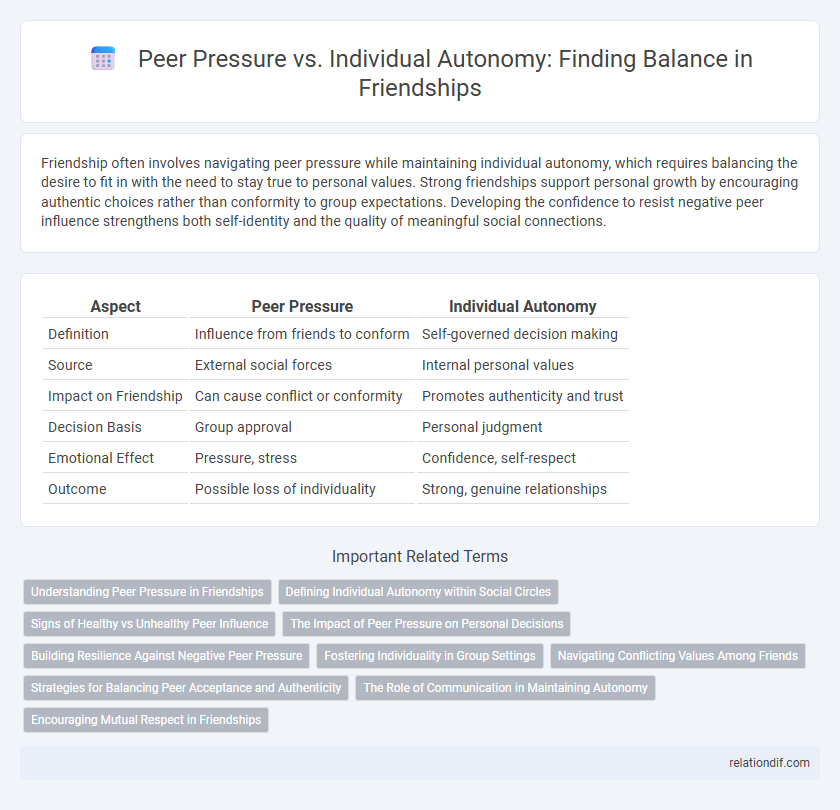Friendship often involves navigating peer pressure while maintaining individual autonomy, which requires balancing the desire to fit in with the need to stay true to personal values. Strong friendships support personal growth by encouraging authentic choices rather than conformity to group expectations. Developing the confidence to resist negative peer influence strengthens both self-identity and the quality of meaningful social connections.
Table of Comparison
| Aspect | Peer Pressure | Individual Autonomy |
|---|---|---|
| Definition | Influence from friends to conform | Self-governed decision making |
| Source | External social forces | Internal personal values |
| Impact on Friendship | Can cause conflict or conformity | Promotes authenticity and trust |
| Decision Basis | Group approval | Personal judgment |
| Emotional Effect | Pressure, stress | Confidence, self-respect |
| Outcome | Possible loss of individuality | Strong, genuine relationships |
Understanding Peer Pressure in Friendships
Peer pressure in friendships often manifests as subtle or overt influence encouraging conformity to group norms, which can challenge an individual's personal values and decisions. Understanding peer pressure requires recognizing the social dynamics that drive friends to seek acceptance, often leading to compromise of individual autonomy. Developing awareness and assertiveness empowers individuals to maintain their identity while navigating the complexities of social acceptance within friendships.
Defining Individual Autonomy within Social Circles
Individual autonomy within social circles refers to the capacity to make independent decisions and uphold personal values despite external influences from peers. It involves maintaining self-identity and exercising critical thinking when faced with peer pressure to conform. This balance ensures authentic relationships while preserving personal integrity and freedom of choice.
Signs of Healthy vs Unhealthy Peer Influence
Healthy peer influence is characterized by mutual respect, encouragement of authentic self-expression, and support for personal growth, fostering a sense of belonging without compromising individual values. Unhealthy peer pressure involves coercion, manipulation, or exclusion tactics, leading to compromised decision-making, anxiety, and loss of self-identity. Recognizing boundaries, open communication, and consistent self-reflection are essential indicators of maintaining individual autonomy within friendships.
The Impact of Peer Pressure on Personal Decisions
Peer pressure significantly influences personal decisions by shaping individual behaviors to align with group norms, often compromising autonomy. Studies reveal that adolescents under peer influence tend to adopt risky behaviors, such as substance use or academic misconduct, to gain acceptance. Maintaining individual autonomy requires awareness of peer dynamics and strengthened self-confidence to resist conformity pressures.
Building Resilience Against Negative Peer Pressure
Building resilience against negative peer pressure involves cultivating strong individual autonomy and self-awareness. Developing critical thinking skills and a clear sense of personal values empowers individuals to resist harmful influences and make decisions aligned with their authentic selves. Supportive friendships that encourage positive behavior reinforce the ability to stand firm against peer pressure and promote healthy social dynamics.
Fostering Individuality in Group Settings
Fostering individuality in group settings enhances personal growth and resilience against peer pressure by encouraging self-expression and critical thinking. Emphasizing unique talents and perspectives within friendships cultivates an environment where authenticity thrives. Supporting individual autonomy empowers members to make independent choices while maintaining meaningful social connections.
Navigating Conflicting Values Among Friends
Navigating conflicting values among friends requires balancing peer pressure with individual autonomy to maintain authentic relationships. Recognizing the influence of peer pressure helps individuals assert their own beliefs and make choices based on personal values rather than group conformity. Developing strong self-awareness and communication skills empowers friends to respect differences and foster mutual understanding without compromising individual integrity.
Strategies for Balancing Peer Acceptance and Authenticity
Maintaining individual autonomy while navigating peer pressure requires cultivating self-awareness and setting clear personal boundaries to preserve authentic values. Developing communication skills allows for assertively expressing opinions without alienating peers, promoting mutual respect and understanding. Engaging in diverse social groups expands perspectives, reducing reliance on a single peer circle for acceptance and reinforcing personal identity.
The Role of Communication in Maintaining Autonomy
Effective communication plays a crucial role in maintaining individual autonomy amid peer pressure by enabling clear expression of personal boundaries and values. Open dialogue fosters mutual respect among friends, reducing the risk of coercion and promoting authentic decision-making. Consistent communication skills empower individuals to assert themselves confidently while preserving meaningful social connections.
Encouraging Mutual Respect in Friendships
Encouraging mutual respect in friendships involves recognizing individual autonomy while navigating peer pressure effectively. Friends who prioritize open communication and validate each other's personal choices foster an environment of trust and support. Cultivating respect for diverse opinions and boundaries strengthens the friendship and promotes healthy, independent decision-making.
Peer Pressure vs Individual Autonomy Infographic

 relationdif.com
relationdif.com